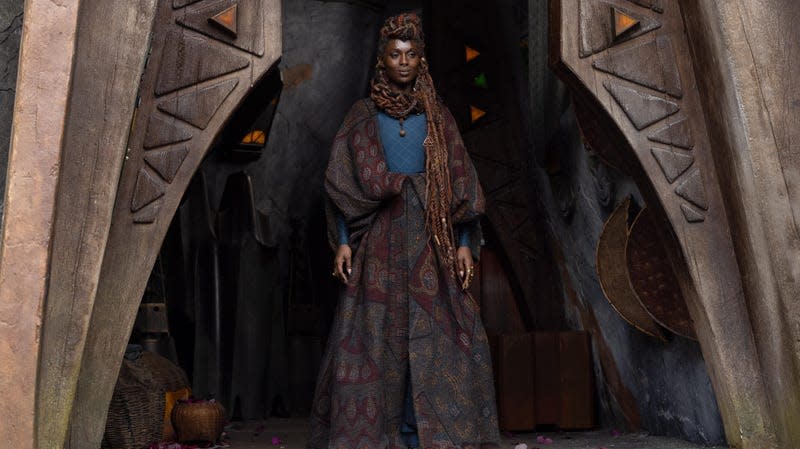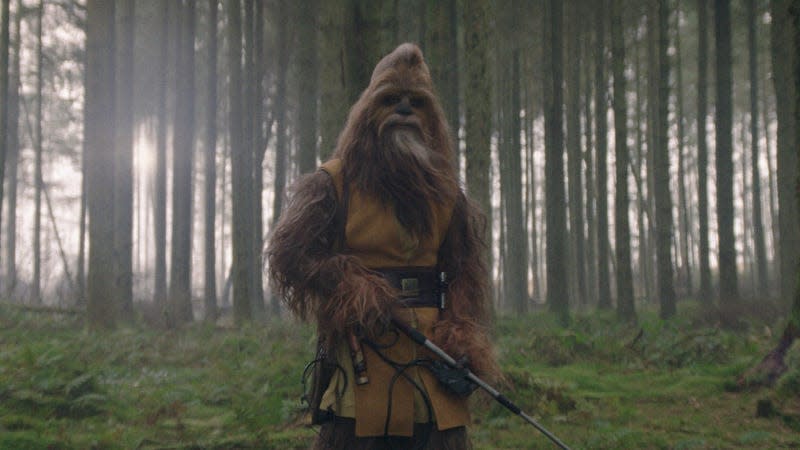The Acolyte Episode 7 Review: The Price Of Misunderstanding

For those of you who’ve felt like any sense of real meaning was gone from the Star Wars franchise since it was acquired by Disney, you’re in for a real treat. The Acolyte episode 7 offers a kind of emotional intelligence and narrative pacing that I would normally associate more with that other decades-spanning sci-fi franchise, Star Trek. That’s a very good thing, as it yields a sense of realism and intimacy that raises the bar for this series.
Episode 7,“Choice,” is the flashback episode we’ve been awaiting since the series began, promising the big reveal of the inciting incident that has caused years of remorse and spun the web of revenge all characters are connected to. We open on the planet Brendok with Jedi Masters Sol (Lee Jung-jae), Indara (Carrie-Anne Moss), and Kelnacca (Joonas Suotamo), and Padawan apprentice Torbin (Dean-Charles Chapman). Immediately, we can feel each Jedi’s sense of self with a beautiful wide shot given to us by episode director Kogonada and cinematographer James Friend. The Jedi are in search of a “Vergence”—a powerful centralization of the Force that can create life, such as the lush forests of Brendok.
This tone of exploration echoes Star Trek in every beat, and affords us a more intimate character portrait for each Jedi. We even get to see them eat together, and without the pressure of any “star war,” we get to see them as people striving for ideals of self mastery and cultivation of wisdom for the benefit of the galaxy. We often hear about these principles when it comes to Jedi, but we don’t often get to feel them without some external pressure distracting us. I absolutely loved this tone, and hope an entire series about the Jedi can be built around it. We don’t always need fighting and chasing to feel something as audience members.
The search for the Vergence leads Sol to discover the mystical child twins, Mae and Osha (played by real life twin actors Lauren and Leah Brady). Sol sees that Mae has markings of dark magic on her body, while Osha does not, leading him to believe that she may be in danger of being sacrificed by their witch coven, given that a celestial event is about to happen. Sol, who lacks a Jedi apprentice, is bent on making sure the children are safe, and he feels a special connection to Osha, who bears no mystic markings. This desire in the supposedly desire-less Jedi leads to an intentionally muddy web of events that don’t reveal many story points that we haven’t seen in previous episodes. The meaning in this episode has very little to do with what’s happening on the outside and far more to do with what’s happening within each character. It’s this exploration of interiority and character that makes it enjoyable.

On the other hand, the episode also suffers from the same Wookiee bias as the original Star Wars trilogy, missing an opportunity to share Kelnacca’s journey. Whether it’s a member of an alien race or a human being from a marginalized group, writers have to be cautious with underrepresenting characters that are killed off (see the old movie stereotype of the “Black guy dies”) or who get their minds controlled by an outside force, both of which happen to Kelnacca as of this episode. There was an anime trope of deeply exploring characters who would be promptly killed off, and as a kid, I always felt the difference in how much more I wanted to know about the characters that died in those stories. Consistently failing to develop characters in a given race is a writing flaw that leads to—for lack of a better term—the dehumanization of that race, even if they’re alien. And since stories educate us on how to view our reality, this can contribute to a lack of consideration and negative treatment of others. So you see, I can’t stop my campaign for Wookiee equal rights.
Amidst all the conflict in this episode, the most overtly significant moment we see is Sol killing Mae & Osha’s mother, Aniseya (Jodie Turner-Smith). Even here, the filmmaking doesn’t emphasize the action. Rather, we are focused on the emotion of Sol’s reactionary fear that led him to draw his lightsaber on her amongst the air of confusion and defensiveness from both the coven and the Jedi. Sol’s remorse is instant, and we feel it in how he allows himself to be hit repeatedly by Aniseya’s partner, Mother Koril (Margarita Levieva). These moments convey one of the greatest gifts we’ve ever received from the Star Wars franchise—the gift of misunderstanding.
Misunderstanding is hard to write. ButThe Acolyte has taken its time to articulate all of the players, the cultures, the differences in perspective, and demonstrates how they can all clash. We understand why they aren’t aligned with each other on a very human level. From my training in martial arts and meditation, I know that a sense of peace can be found in conflict. Now, all I’m left seeking is a sense of purpose and completion to the chaos. Let’s hope the finale in episode 8 delivers.


